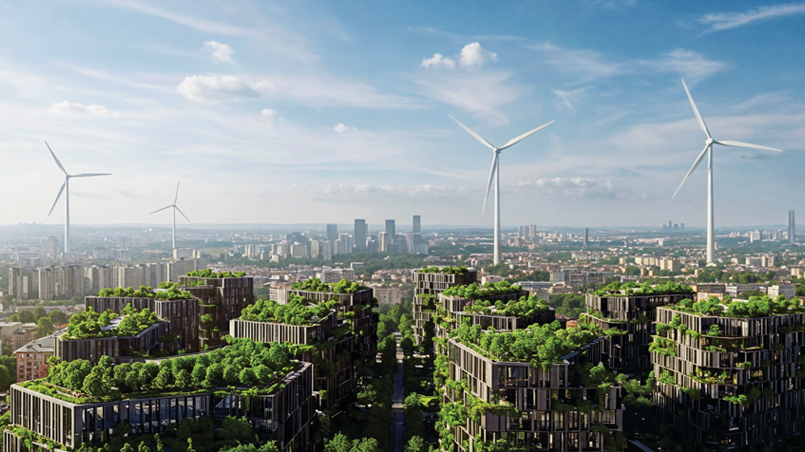A Report on 25th International Conference on Environment Management and Climate Change

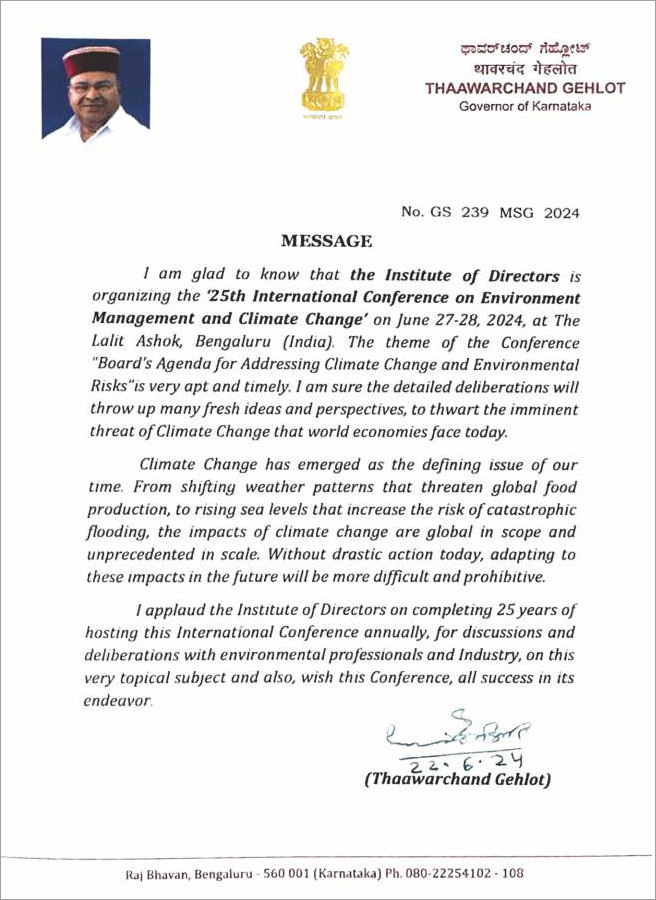
DAY 1
The Institute of Directors (IOD), India, organised the 25th International Conference on Environment Management and Climate Change in Bengaluru (India) during June 27–28, 2024. The venue of the Conference was Hotel The Lalit Ashok in Bengaluru. The theme of this year's Conference was “Board's Agenda for Addressing Climate Change and Environmental Risks”. The famed Golden Peacock Awards instituted by the IOD for 'Occupational Health & Safety', 'Environment Management', 'Eco- Innovation' and 'Energy Efficiency' for 2024 were also conferred on the winners during the Awards ceremony. The convention was attended by around 450 participants, comprising Industry and Business Leaders, Board members, directors, policy-makers, educationalists, and private as well as public sector institutions, with representation by both central and state governments.
PLENARY SESSION – I: Inaugural Session
The Inaugural Session commenced with the ceremonial lighting of the lamp by distinguished guests of the Conference.
The 'Welcome Address' was delivered by:
Mr. D. V. Prasad, IAS (Retd.)
Hon. Chairman, Institute of Directors - Bengaluru Region
former Add. Chief Secretary, Karnataka & former CMD, Food Corporation of India, Govt. of India
Mr. Prasad at the very outset underscored the importance of prioritising Climate Change by the leaders and decision-makers. He emphasized the need to place it prominently on the board's strategic agenda, focusing individually on critical issues such as water management and waste management. He called on leaders, policymakers, and environmental experts to focus on these burning issues and take decisive action. He also advised companies and governments to pursue actionable outcomes, aiming to contribute to a greener and more sustainable world, eventually.
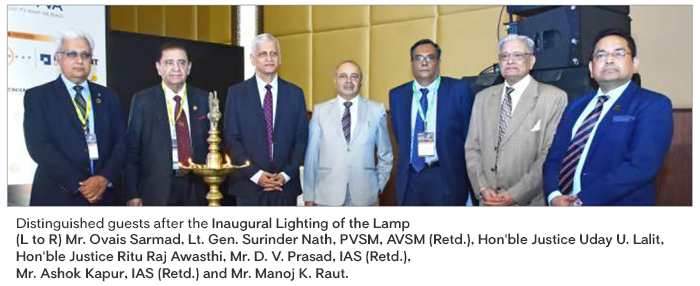
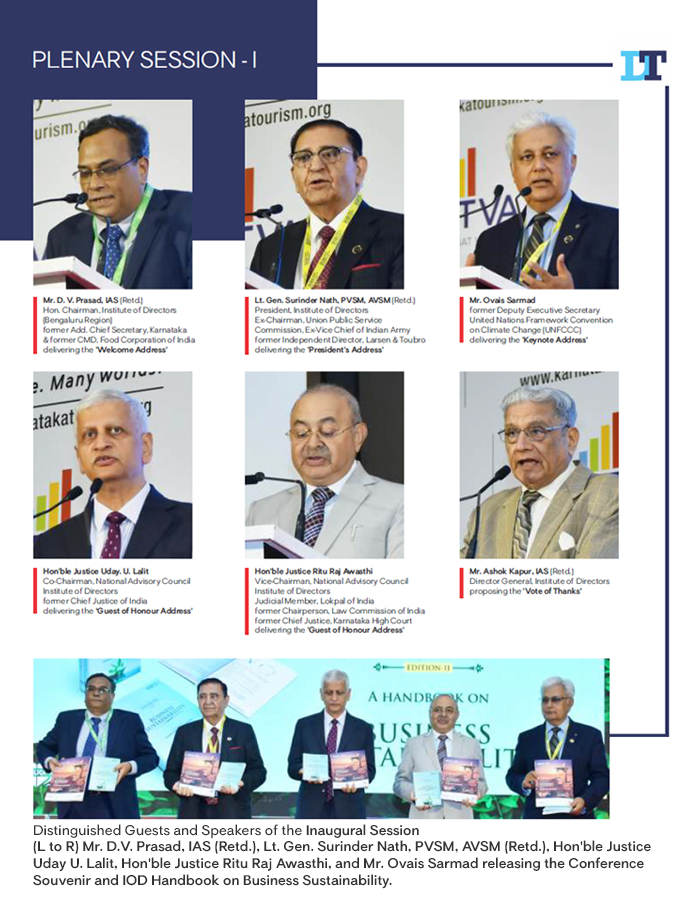
This was followed by the 'President's Address' delivered by:
Lt. Gen. Surinder Nath, PVSM, AVSM (Retd.)
President, Institute of Directors
former Chairman, Union Public Service
former Vice Chief of Indian Army
former Independent Director, Larsen & Toubro
Lt. Gen. Nath emphasized that the urgent global climate crisis, underscored by 2023 being the warmest year on record, necessitates immediate action to limit global temperature rise and achieve Net Zero emissions by 2040. He highlighted the extreme weather events, biodiversity loss, and significant economic impacts affecting billions worldwide. He added that business must leverage their resources to mitigate these risks, with corporate boards playing a crucial role in integrating climate action with strategies, governance, and risk management. He further added that effective leadership, deep strategic planning, sustainable finance, transparency, stakeholder engagement, innovation, and capacity building are essential for a sustainable future. He announced that the 2024 IOD conference aims to transform global experience into actionable strategies, and will conclude with the Golden Peacock Awards for Excellence in Environmental Management and Climate Action
This was followed by the 'Keynote Address' delivered by
Mr. Ovais Sarmad
former Deputy Executive Secretary
United Nations Framework Convention on Climate Change (UNFCCC)
Mr. Sarmad, as one of the experts of the COP, discussed environmental governance, green growth, and the role of Boards. He emphasized that international efforts and global binding agreements have driven national actions towards a greener future. Without these efforts, the world would have already surpassed 4 degrees of global warming. He noted that all sectors are witnessing innovation, aimed at reducing Climate Change. However, despite these innovations, greenhouse gas (GHG) emissions continue to rise. Mr. Sarmad stressed that Boards need to openly acknowledge the importance of green growth strategies and prioritise setting a 'net-zero' target as a critical business objective. He highlighted the necessity of implementing a robust and transparent accountability and reporting mechanism. Additionally, he advocated for fostering a culture of green growth—decoupling harmful growth for profit from sustainable development—where all stakeholders, including customers, suppliers, investors, and management, contribute and benefit.
This was followed by the 'Guest of Honour Address' delivered by:
1. Hon'ble Justice Uday U. Lalit
Co-Chairman, National Advisory Council Institute of Directors
former Chief Justice of India
2. Hon'ble Justice Ritu Raj Awasthi
Vice-Chairman, National Advisory Council Institute of Directors
Judicial Member, Lokpal of India, former Chairperson, Law Commission of India former Chief Justice, Karnataka High Court
Justice Lalit shared his views on the Institute of Directors (IOD), initially viewing it as an organisation solely focused on corporate governance until he became a jury member for the Golden Peacock Awards of IOD. He recalled learning as a child that Cherrapunji was the wettest place in India and Churu in Rajasthan was the hottest. However, today, Cherrapunji has lost its prominence, and Delhi has surpassed Churu in terms of high temperature. Reflecting on his childhood visits to his grandmother's home in Pune, he noted, "Back then, we didn't even have a fan, but now, air conditioning is essential." Justice Lalit emphasized the importance of balancing the three Ps: People, Planet, and Profit. He believes that achieving this balance is crucial to meeting the Sustainable Development Goals (SDGs). He expressed confidence that institutions like IOD will play a crucial role in encouraging the corporate sector to strive for attaining this balance and contribute to sustainable development.
Justice Awasthi started his address by highlighting Bangalore's weather as a gentle reminder of the natural beauty around us. He described the city as a hub of technology and sustainable living. He emphasized the crucial role of ethics in addressing climate change, referencing the latest IPCC report that paints a stark picture of the consequences of inaction. He noted the recent record-breaking heat waves in the US and Canada as evidence that these consequences are no longer theoretical. Justice Awasthi stressed the significant role of industry and global governance in shaping our future. He advocated for investing in green technology and sustainable growth to reduce our dependency on fossil fuels, emphasizing that the choices we make today will shape the world of tomorrow.
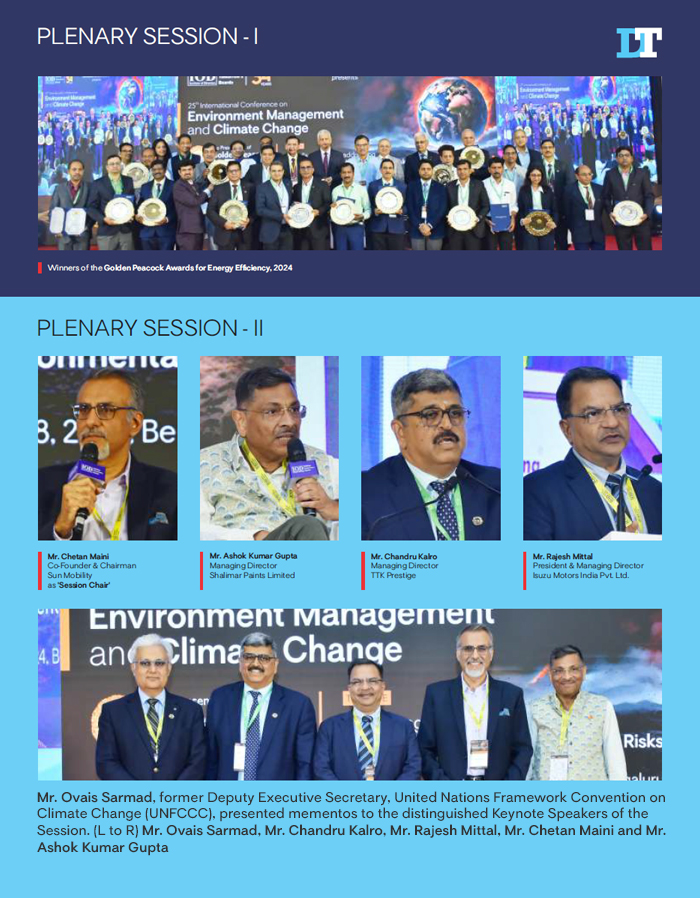
This was followed by the release of the Convention Souvenir and IOD Handbook on Business Sustainability, by our Special Guests, Justice Uday U. Lalit, Justice Ritu Raj Awasthi, Mr. Ovais Sarmad, and Mr. D.V. Prasad, IAS (Retd.).
This was followed by the Presentation of Golden Peacock Awards for Energy Efficiency, 2024.
The 'Vote of Thanks' was delivered by Mr. Ashok Kapur, IAS (Retd.), Director General, Institute of Directors. Mr. Kapur expressed IOD's gratitude to the Guest of Honour, Justice Uday U. Lalit, who had especially travelled from Delhi to inspire the audience. He further extended IOD's thanks to Justice Ritu Raj Awasthi for generously sharing his invaluable time with us. Mr. Kapur also thanked Mr. Ovais Sarmad, who had travelled all the way from Spain, Dr. Shalini Rajneesh, IAS in absentia, and Mr. D. V. Prasad, IAS (Retd.) for gracing the international meet
PLENARY SESSION- II: Role of Board in Achieving SDGs and Net Zero Goals
The Session was chaired by:
Mr. Chetan Maini
Co-Founder & Chairman
SUN
The Distinguished Speakers of the Session were:
1. Mr. Ashok Kumar Gupta
Managing Director
Shalimar Paints Limited
2. Mr. Chandru Kalro
Managing Director
TTK Prestige
3. Mr. Rajesh Mittal
President & Managing Director
Isuzu Motors India Pvt. Ltd.
Mr. Maini began by stating, "We should see ESG not as compliance but as an opportunity. It is the Board's responsibility to address climate change and take action towards it. They should set targets with the SDGs in mind." He emphasized that organisations must consider global perspectives and strategies. He said that an ethical leadership and corporate culture play a critical role in ensuring that the board leads by setting the right examples.
Mr. Gupta drew a parallel between meditation and sustainability, noting that while both are often perceived as costs, their long-term benefits far outweigh the initial investments. He noted that CEOs are typically focused on the stock market and driven by the P/E ratio as a primary growth indicator. As a result, they often struggle to prioritise crucial social benefits, as ESG benefits ca be realized over the long term. He said that initially, there was widespread resistance to CSR among the corporates, but over time, opposition has declined significantly. He added that as board members, we must ensure we look beyond the next financial year and envision for the next 25 years. We need to re-think beyond our immediate concerns and focus on long-term sustainability and growth.
Mr. Kalro stated that over 93% of urban India owns a pressure cooker today. One significant cause of indoor air pollution is the continuing use of traditional chulhas for cooking, which, on an average, produces pollution equivalent to smoking 20 cigarettes per hour. To address this problem, TTK Prestige has promoted electric cooking using 'induction stoves', that are 90% efficient compared to LPG's 70% efficiency. Additionally, TTK recently converted their most power-intensive plant 'green'. This was accomplished by forming a multifunctional team from various departments, providing training, and incentivizing all stakeholders involved in the project. He believes that the future is bright for any company that is both empathetic and sympathetic to its various stakeholders.
Mr. Mittal explained his company's efforts in ESG, stating, "There are 17 SDGs, and the Isuzu group has adopted 7 of these for all their factories worldwide. Since Isuzu uses fossil fuels, we have committed to complying with all four listed environmental objectives". He said that they are also transitioning to vehicles that do not cause pollution, including electric vehicles (EVs), and are addressing the challenge of handling the generated EV waste responsibly. We will continue to make aware the civil society and also our employees about sustainability. Our commitment is to remain a sustainable organisation and always act responsibly towards our stakeholders.
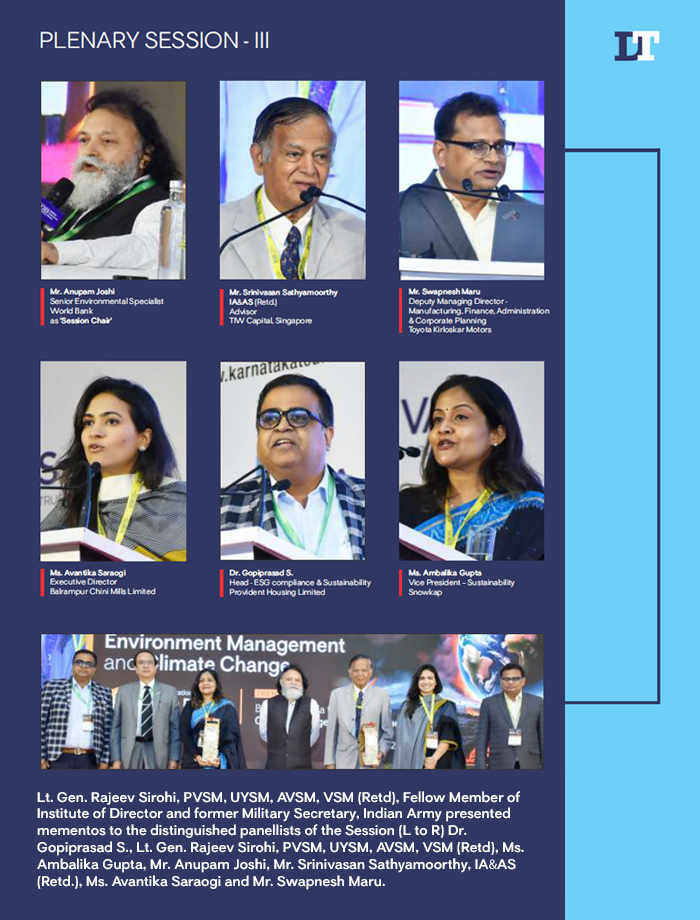
The Session was followed by an interactive Q&A session with the audience.
PLENARY SESSION – III: Environmental Governance: Developing and Scaling up Green Growth Solutions
The Session was chaired by:
Mr. Anupam Joshi
Senior Environmental Specialist
World Bank
The Distinguished Speakers of the Session were:
1. Mr. Srinivasan Sathyamoorthy, IA&AS (Retd.)
Advisor - TIW Capital, Singapore
2. Mr. Swapnesh Maru
Deputy Managing Director - Manufacturing, Finance, Administration & Corporate Planning
Toyota Kirloskar Motors
3. Ms. Avantika Saraogi
Executive Director - Balrampur Chini Mills Limited
4. Dr. Gopiprasad S.
Head - ESG Compliance & Sustainability
Provident Housing Limited
5. Ms. Ambalika Gupta
Vice President – Sustainability
Snowkap
Mr. Joshi defined the World Bank as a 'developmental institution' that support all its member countries. "India is one of its largest clients, receiving around $1-3 billion in loans annually". The World Bank devised an Environmental and Social Framework (ESF) that all organisations must comply with when receiving loans. The Bank's new vision is to create a world free of poverty on a liveable planet. Many adaptation solutions can be worked out come from 'biodiversity'. He said that since 2018, the World Bank has focused on reducing marine plastic pollution, and it is making good progress towards this objective.
Mr. Sathyamoorthy emphasized the pressing issue of the emerging water crisis. He emphasized the need to prioritise 'water conservation' and 'sustainability' to secure a sustainable future. Drawing attention to the water crises being experienced at TIW Capital's Gujarat plant, he highlighted several key issues and added that sustainability must become the default choice, starting with Resident Welfare Associations. He stressed that this shift won't be possible if 'greed outweighs need'. Currently, GDP is prioritised over health, and market capitalization over pollution; this perspective must change. He noted that the threshold of 1.5 degrees Celsius has already been breached, reaching 1.52 degrees. To combat these challenges, he said that TIW Capital is committed to investing in and supporting yellow, blue, and 'green bonds' to ensure a sustainable future.
Mr. Maru began with a memorable quote: "We are the first generation to feel the effects of climate change, and probably the last generation which can do something about it." He emphasized that ESG is integral to business, yielding real and tangible outcomes. He then highlighted TKM's journey towards sustainability. Starting in 1992, they took voluntary combined action with technology. By 2016, they had identified and addressed six key challenges, developed a sustainability policy, and set specific targets for themselves by 2022. Today, they have established ecozones covering around 25 acres and have set a policy target to achieve net zero by 2050.
Ms. Saraogi began by introducing her organisation, Balrampur Chini Mills Limited. "Today, we operate in 10 locations, have 5 distilleries, and produce around 500 MW of green power. Sugarcane, which is 70% water and 30% biomass, is used for power generation through biomass. Green growth can be sustainable and very profitable," she stated. Highlighting their achievements, she mentioned, "As of May 2024, our company has achieved a 15% blend of ethanol in petrol, up from 1.5%. In the next 1.5 years, we planned to reach a 20% blend. Additionally, all our distilleries operated on a Zero Liquid Discharge (ZLD) basis." Through the example of her company, she demonstrated how green growth could indeed be profitable.
Dr. Gopiprasad S. highlighted the pressing demand for housing in the country and the significant impact of real estate on the economy. He acknowledged that improving the quality of life remains a challenge but emphasized his company's commitment to being an early player in achieving Net Zero. He stated, "ESG serves as a vital bridge between growth and sustainability. One cannot choose between growth and sustainability - we must achieve both." He also outlined the benchmarks set for ESG (Environmental, Social, and Governance) and the sustainability metrics employed by his company. "Our sustainability metrics include identifying key performance indicators (KPIs) for sustainability, engaging with stakeholders, investors, and clients, and collaborating with institutions focused on the environment. We strive to lead by example in the sector," he announced.
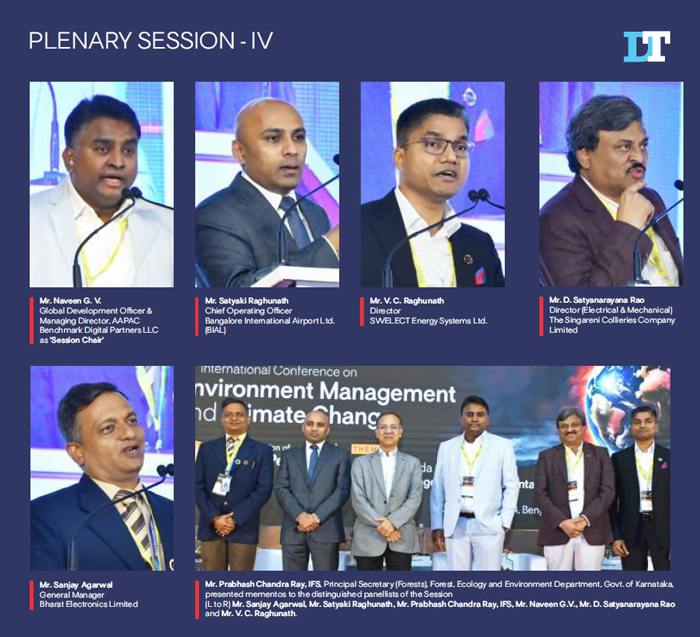
Ms. Gupta began by discussing Snowkap, a Net Zero SaaS platform designed to help companies improve their ESG performance and reduce their carbon footprint. She outlined several risks that need to be first considered: physical risk, supply chain risk, reputational risk, regulatory risk, litigation risk, taxation risk, and human capital risk. She highlighted the increasing issue of greenwashing, noting that Canada has recently introduced a regulatory framework to address this problem. She explained the misconception about plastics, pointing out that plastic was not invented for multiple uses. For example, she explained that a glass bottle can be more harmful to the environment than a plastic bottle unless it is reused at least 150 times. She also identified several challenges in addressing climate change: poor motivation, limited time, low engagement, complex methodologies, and the gap between knowledge and action.
The Session was followed by an interactive Q&A session with the audience.
PLENARY SESSION – IV: Green Growth and Way forward for a Sustainable Future
The Session was chaired by:
Mr. Naveen G. V.
Global Development Officer & Managing Director, AAPAC Benchmark Digital Partners LLC
The Distinguished Speakers of the Session were:
1. Mr. D. Satyanarayana Rao
Director (Electrical & Mechanical)
The Singareni Collieries Company Limited
2. Mr. Satyaki Raghunath
Chief Operating Officer - Bangalore International Airport Ltd. (BIAL)
3. Mr. V. C. Raghunath
Director - SWELECT Energy Systems Ltd.
4. Mr. Sanjay Agarwal
General Manager - Bharat Electronics Limited
Mr. Naveen G. V. began by sharing his company's tagline: “Empowering ESG’s Digital Transformation with AI.” He also introduced their proprietary software, Benchmark Gensuite, which plays a crucial role in their overall ESG strategy. He outlined the key drivers of his company's ESG landscape: global goals and principles, reporting frameworks, regulations, and ESG ratings and rankings. Mr. Naveen highlighted the increasing number of requests from various stakeholders, including regulators, NGOs, and companies, to share their infrastructure. He mentioned the daunting task of replying to around 1500 questions related to reporting frameworks. However, he emphasized that AI has significantly streamlined this process, making it more efficient and aligning it with the Business Responsibility and Sustainability Reporting (BRSR) framework.
Mr. Rao informed that their company, one of the oldest coal companies in India, was established during the British era. Today, they operate 39 mines - 22 underground and 17 open-air and produce around 1200 MW of power. He acknowledged the significant challenges facing the coal industry in India, noting that the Ministry of Coal is urging them to increase production limits while ensuring sustainable practices. Mr. Rao then outlined their roadmap for renewable energy (RE) projects within Singareni Collieries Company Limited (SCCL), highlighting several key initiatives such as establishing a 500 MW Ground- Mounted Solar Plant in Rajasthan, setting up a 300 MW Floating Solar Photovoltaic (FSPV) Plant at LMD. He emphasized that these projects are part of their comprehensive energy strategy, which also includes expanding their existing thermal plants.
Mr. Satyaki Raghunath began by explaining about Bangalore International Airport, a public-private partnership that handles around 90-100 million passengers per annum. Over the past 16 years, the airport has experienced a 4x growth, leading to significant environmental impacts. He outlined their vision for sustainability, which includes goals based on sustainability pillars, diversity, and risk assessment. Recently, they have shifted their focus now to water preservation. Notably, the airport has been operating on 100% renewable energy for the past four years. Mr. Raghunath highlighted their commitment to sustainable procurement and with pride, mentioned that they were the first airport in India to go paperless in cargo conversions. He concluded by emphasizing the pride that every Bangalorian feels for this airport and its achievements in sustainability.
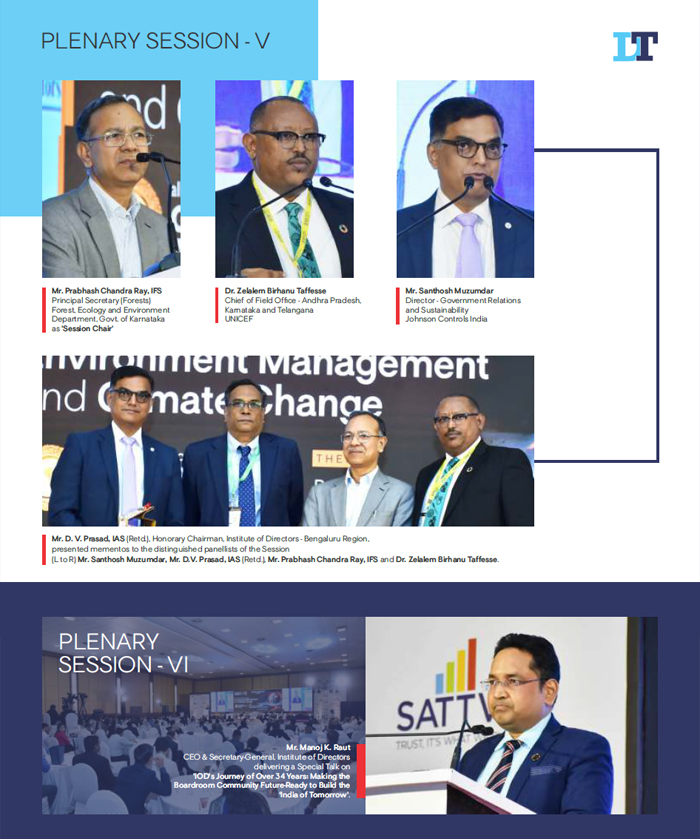
Mr. V. C. Raghunath began by discussing the concept of 'green growth' and outlined a path forward towards a sustainable future, emphasizing the role of technology in enabling companies to adopt environment- friendly practices. He highlighted several key drivers for embracing green initiatives, including achieving net zero emissions, expanding renewable energy (RE) capacity, fulfilling RE purchase obligations, setting ambitious sustainability targets, and implementing Energy Automation Management systems. He said "going green is not an expense; it is achievable by each one of us present here." Mr. Raghunath then provided an overview of capital expenditure (CAPEX) trends for Solar PV systems. Further, he outlined various business models for renewable energy adoption. These include Captive Power Purchase Agreements (PPA), where companies invest in an equity stake in a Special Purpose Vehicle (SPV), and third-party PPAs, where energy is procured from external suppliers.
Mr. Agarwal highlighted the pressing challenges we all face, from water scarcity to climate change. He said that his company manufactures vital defense equipment for the government, and has been a pioneer in adopting innovative technologies to improve efficiency and sustainability. They were India's first Public Sector Undertaking (PSU) under the Department of Public Sector Enterprises (DPSE) to implement SAP back in 2008, despite initial cost concerns, setting a precedent in the defence sector. Subsequently, they adopted a file lifecycle management tool, which not only reduced file management costs but also significantly minimized paper usage. Processes like leave requests, payroll management, and medical reimbursements have been digitised, underscoring their commitment to efficiency and sustainability. Originally aiming at 50% renewable energy by 2030, they now anticipate reaching this milestone even earlier by 2024-2025 and aiming at 100% renewable energy by 2028. Additionally, they are fully committed to Extended Producer Responsibility (EPR), further integrating sustainability into their technical operations.
The Session was followed by an interactive Q&A session with the audience.
PLENARY SESSION – V: Impact of Environment, Climate and Sustainability Working Group on Water Crisis and Waste Management & Water Security
The Session was chaired by:
Mr. Prabhash Chandra Ray, IFS
Principal Secretary (Forests)
Forest, Ecology and Environment Department, Govt. of Karnataka
The Distinguished Speakers of the Session were:
1. Dr. Zelalem Birhanu Taffesse
Chief of Field Office - Andhra Pradesh, Karnataka and Telangana
UNICEF (United Nations International Children's Emergency Fund)
2. Mr. Santhosh Muzumdar
Director - Government Relations and Sustainability
Johnson Controls India
Mr. Ray emphasized the critical importance of water management, highlighting the unfolding crisis exacerbated by unsustainable practices in various industries. He pointed out innovative steps by Karnataka, including the cultivation of less water-intensive crops and proposals for high-rise buildings where adequate water supply is currently lacking. Mr. Ray urged all organisations to adopt a Zero Liquid Discharge (ZLD) policy, thereby promoting water recycling to ensure all processes achieve zero liquid discharge. He cited the example of the Asia Mall in Bangalore as a case of successful implementation. He underscored the need to create wealth sustainably, balancing economic growth with environmental responsibility. He also mentioned the KC Valley Project, designed to treat 440 million litres of sewage water daily and recharge groundwater in drought-prone districts like Kolar and Chikkaballapur. This initiative illustrates a proactive approach to sustainable water management in addressing local water scarcity challenges.
Dr. Taffesse from UNICEF highlighted the critical importance of water waste management, especially in the context of India's significant advancements across various social sectors. Despite these advancements, he pointed out that today more than half of underground wells are depleting rapidly, attributing this water stress to factors such as population growth, industrialization, urbanization, and pollutants. In Karnataka, the water stress situation is particularly severe. He noted that in 2019, air pollution alone contributed to 18% of all deaths in India, totaling 1.7 million people, according to official statistics. He acknowledged the efforts of the Government of India through initiatives like Swachh Bharat and Jal Jeevan Mission, aimed at improving water management cycles. Dr. Taffesse emphasized the need for community-led reduction initiatives, local participation, and the active involvement of the private sector as crucial partners in addressing these challenges. He concluded by highlighting the vulnerability of children to climate change impacts, stressing that protecting them from environmental changes is crucial for securing our common future.
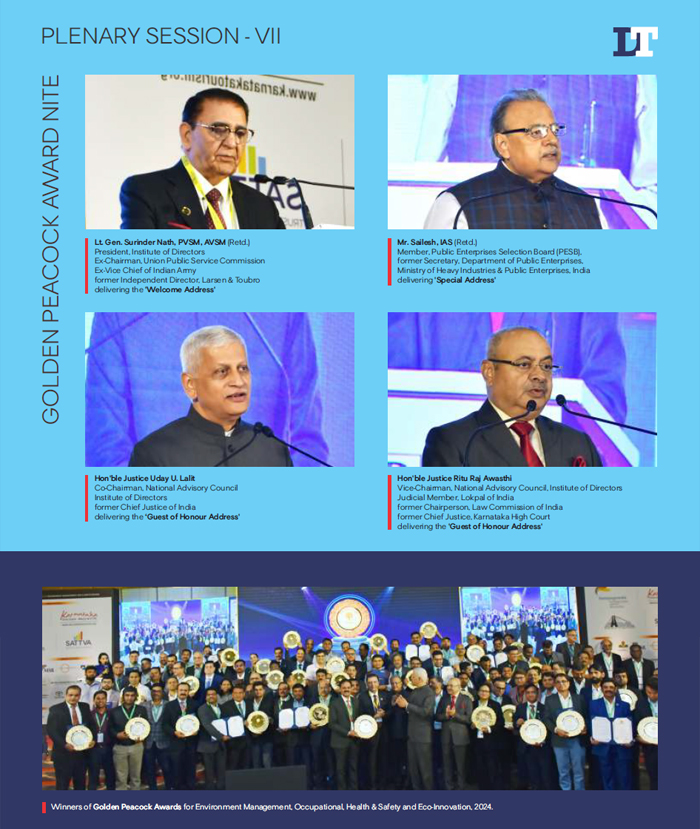
Mr. Muzumdar began by highlighting the significance of allocation of water resources in India, with 78% being used for agriculture, 6% for domestic use, and 5% for industrial purposes. He quoted ancient wisdom from Kautilya's Arthashastra, emphasizing the importance of efficiently utilizing natural resources. Addressing general awareness of water scarcity, he expressed that the issue is widely acknowledged. He introduced the concept of the Green Star Challenge, outlining five actions to promote water conservation: (i) Use water-efficient technology and devices; (ii) Utilize eco-friendly treated water for nondrinking purposes; (iii) Implement recharge pits to replenish underground water for bore wells; (iv) Monitor and measure water consumption from bore wells and other sources; and (v) Raise awareness and promote water sustainability among all stakeholders. He concluded optimistically, noting the availability of technology and urging for government incentive models to prioritise rapid implementation of water conservation efforts.
The Session was followed by an interactive Q&A session with the audience.
PLENARY SESSION VI: IOD’s Journey of over 34 Years: Making the Boardroom Community Future-Ready to build the 'India of Tomorrow
A Special Talk was delivered by:
Mr. Manoj K. Raut
CEO & Secretary-General - Institute of Directors
Mr. Raut addressed the crucial needs of becoming an effective Independent Director (ID) or Board Member, focusing on tech savvy, personal branding, domain expertise, studying board regulations, and financial literacy. He highlighted the role of the Institute of Directors (IOD) in assisting corporate boards to find skilled members. He said that climate change continues to be a significant challenge for directors in 2024, necessitating sustainable practices and immediate action to mitigate extreme weather events and safeguard critical global areas like the Congo Basin Peatlands. He also noted that Artificial Intelligence (AI) is now being presented as the driver of a new Industrial Revolution, with India focusing on initiatives like 'Make in India' to foster growth. He emphasized the need for 'Total Quality', 'Trust', and 'Transparency' to achieve growth and sustainability. His 'call to action' encouraged everyone to contribute to building a prosperous, ethically governed 'India of Tomorrow', also drawing inspiration from leaders like the late Dr. APJ Abdul Kalam, the former President of India.
PLENARY SESSION – VII: GOLDEN PEACOCK AWARDS NITE
The 'Welcome Address' was delivered by:
Lt. Gen. Surinder Nath, PVSM, AVSM (Retd.)
President, Institute of Directors
former Chairman, Union Public Service Commission
former Vice Chief of Indian Army
former Independent Director, Larsen & Toubro
Lt. Gen. Nath warmly welcomed the Guests of Honour, Hon'ble Justice U. U. Lalit, former Chief Justice of India; and Hon'ble Justice Ritu Raj Awasthi, Judicial Member, Lokpal of India, former Chairperson, Law Commission and former Chief Justice, Karnataka High Court. He also welcomed Mr. Sailesh, IAS (Retd.), former Secretary, Department of Public Enterprises, Ministry of Heavy Industries & Public Enterprises, India. He further welcomed other important assembled distinguished dignitaries & guests, and congratulated all the winners of the famed Golden Peacock Awards. He mentioned that the Golden Peacock Award had been instituted by the Institute of Directors (IOD), India in 1991, and has since contributed in promoting corporate governance standards in various Indian industries. The Award, one of the flagship initiatives of IOD, has been recognized worldwide as a 'badge of excellence'.
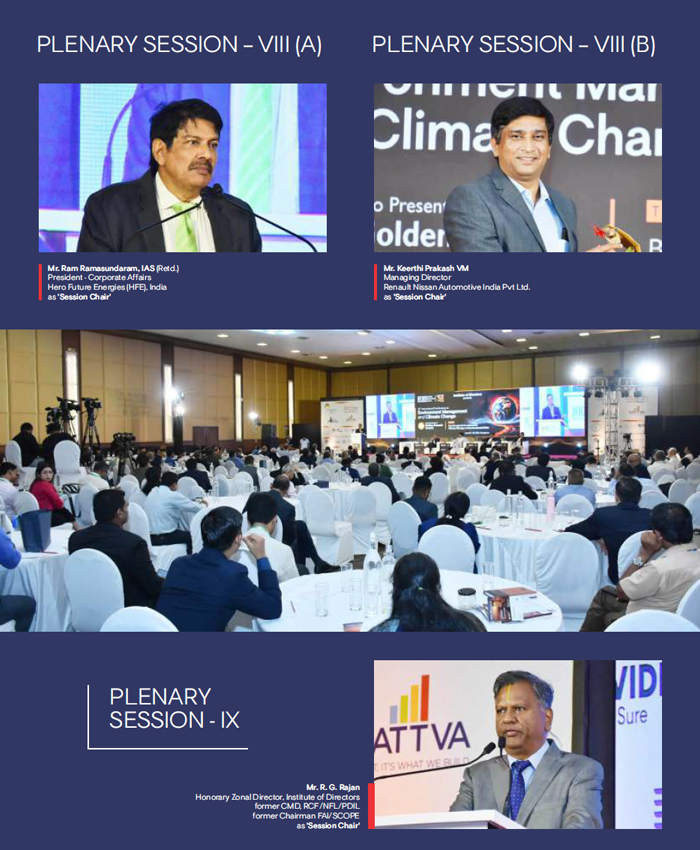
The 'Special Address' was delivered by:
Mr. Sailesh, IAS (Retd.)
Member, Public Enterprises Selection Board (PESB) former Secretary, Department of Public Enterprises, Ministry of Heavy Industries & Public Enterprises, India
Mr. Sailesh underscored the critical role of environment and climate considerations in achieving sustainable growth, emphasizing that sustainable development must be accompanied by overall economic growth. He highlighted India's ascent to becoming the 4th largest economy globally and pointed out the introduction of regulations that incentivize responsible practices while simultaneously discouraging harmful ones. In his view, while maximizing shareholder value is important, optimizing shareholder value through sustainable practices is crucial. He defined sustainable growth as achieving organisational efficiency, promoting recycling, and creating value not only quantitatively but also qualitatively, ensuring that wealth distribution benefits every corner and citizen of the country. Mr. Sailesh commended the public sector for embracing change and fostering a conducive environment. He emphasized that value creation should benefit all stakeholders, not just the government. He concluded by calling on every company to commit to sustainability, advocating for improved structures and environments that benefit everyone.
This was followed by the 'Guest of Honour Address' delivered by:
1. Hon'ble Justice Uday U. Lalit
Co-Chairman, National Advisory Council Institute of Directors
former Chief Justice of India
2. Hon'ble Justice Ritu Raj Awasthi
Vice-Chairman, National Advisory Council Institute of Directors
Judicial Member, Lokpal of India
former Chairperson, Law Commission of India
former Chief Justice, Karnataka High Court
Justice Lalit delved into significant milestones achieved by IOD, noting that the movement commenced in 1991, coinciding with India's opening up its economy to the global markets. He recounted India's commitment to the Bank of London with 50 tonnes of gold just prior to this economic shift, marking India's emergence as a leading global economy today. Justice Lalit continued by referencing the societal impact of the Mandal Commission's introduction in the last 34 years, which enabled broader societal contributions to India's growth. He pointed out another milestone in 1992 with the Mohini Jain legal case, which established the 'right to free education' for children up to 16 years old. Lastly, he underscored the founding of the IOD in 1991 as another significant milestone in the landscape of good organisational governance and ethical leadership.
Justice Awasthi thanked Justice Uday U. Lalit, Mr. Sailesh, IAS (Retd.), and Lt. Gen. Surinder Nath. He then congratulated each and every winner of the Awards, thanking the organisers for their efforts in ensuring the Convention's success.
This was followed by the Presentation of the Golden Peacock Awards for ‘Environment Management’, ‘Occupational Health & Safety’, and ‘Eco-Innovation’ for the year 2024.
DAY 2
PLENARY SESSION – VIII (A): Case Study Presentations
Success Stories on Effective Implementation of Occupational Health & Safety (OHS)
The Session was chaired by:
Mr. Ram Ramasundaram, IAS (Retd.)
President - Corporate Affairs
Hero Future Energies (HFE), India
Mr. Ramasundaram emphasized the significance of human life. While acknowledging the importance of achieving bottom-line and Quality results in subsequent quarters, he highlighted incidents where negligence had led to a loss of life. The central concern remains: How can we effectively safeguard the lives of both our employees, clients, and customers?
Case Studies on the 'Effective Implementation of Occupational Health & Safety (OHS)' category were shared by the below-mentioned companies:
1. Tata Motors Limited
2. Subros Limited
3. Heidelberg Cement India Limited
4. Larsen & Toubro Limited
5. Panasonic Life Solutions India Private Limited
6. Indian Farmers Fertiliser Cooperative Limited
7. Reckitt Benckiser India Private Limited
8. GAIL (India) Limited
9. HCL Technologies Limited
Each Presentation was followed by an interactive Q&A session with the audience.
PLENARY SESSION – VIII (B): Case Study Presentations
Success Stories on Effective Implementation of Occupational Health & Safety (OHS)
The Session was chaired by:
Mr. Keerthi Prakash VM
Managing Director - Renault Nissan Automotive India Pvt. Ltd.
Mr. Prakash congratulated all the teams on winning the Golden Peacock Awards. In the context of India's rapid industrial growth, he observed that safety often takes a back seat to business results. However, he acknowledged that recent initiatives indicate a positive shift towards prioritizing safety. He emphasized that sustained safety relies on fostering a collective mindset across the entire organization, from operators to directors. Drawing from his experience in Japan and Europe, where Japan is particularly noted for its disciplined approach to safety, he pointed out that risk-taking, whether in everyday situations or industrial environments, often leads to accidents. Reflecting on his tenure as Managing Director at Renault, he shared that by making safety a top priority through daily audits and management-led initiatives, the incident rate significantly decreased, aligning with European standards. He encouraged adopting a safety-first mindset and demonstrating it through leadership.
Case Studies on the 'Effective Implementation of Occupational Health & Safety (OHS)' category were shared by the below-mentioned companies:
1. Odisha Mining Corporation Limited
2. Larsen & Toubro Limited, L&T Energy Hydrocarbon
3. Hindustan Petroleum Corporation Limited
4. Bharat Petroleum Corporation Limited
5. Asian Paints Limited
6. NTPC Limited
7. Crest Digitel Private Limited
8. L&T Metro Rail (Hyderabad) Limited
Each Presentation was followed by an interactive Q&A session with the audience.
PLENARY SESSION – IX: Case Study Presentations
Success Stories on Effective Implementation of Energy Efficiency
The Session was chaired by:
Mr. R. G. Rajan
Honorary Zonal Director, Institute of Directors
former CMD, RCF/NFL/PDIL
former Chairman, FAI/SCOPE
Mr. Rajan emphasized the importance of presenting a brief overview of efficiency in various sectors, such as chemicals, transport, and household, highlighting the benefits of cost savings, environmental advantages, and conservation. He discussed the decline in energy intensity since 1981, noting that energy intensity was 6 megajoules per dollar of GDP in 2001 and dropped to 4 megajoules per dollar of GDP by 2020. He mentioned that the UK leads in energy intensity with a figure of 2.8, while India is at 2.4, suggesting that India should aim to improve to 3 or 3.5 in the future. He pointed out that India is among the top countries in energy consumption in the fertilizer sector, with many companies diligently working towards energy efficiency and setting benchmarks.
Case Studies in the 'Energy Efficiency' category were shared by the below-mentioned companies:
1. MG Motor India Private Limited
2. Tata Motors Passenger Vehicles Limited
3. Marelli Motherson Automotive Lighting
4. Prism Johnson Limited
5. CtrlS Datacenters Limited
6. Schneider Electric India Private Limited
7. Rashtriya Chemicals and Fertilizers Limited
8. Rail Coach Factory
9. Hindustan Petroleum Corporation Limited
10. Reliance Industries Limited
11. JSW Energy Limited
12. Reliance Jio Infocomm Limited
Each Presentation was followed by an interactive Q&A session with the audience.
PLENARY SESSION – X: Case Study Presentations
Success Stories on Effective Implementation of Environment Management & Eco Innovation
Case Studies in the 'Environment Management' category were shared by the below-mentioned companies:
1. Tagros Chemicals India Private Limited
2. PI Industries Limited
3. Oil and Natural Gas Corporation Limited
4. NTPC Limited
5. Steel Authority of India Limited
Case Studies in the 'Eco Innovation' category were shared by the below-mentioned companies:
1. Tata Motors Limited
2. Gujarat Fluorochemicals Limited
3. Benchmark ESG Private Limited
4. Oil and Natural Gas Corporation Limited
5. JSW Steel Limited
Each Presentation was followed by an interactive Q&A session with the audience.
In conclusion, IOD is especially grateful to its Event Partners:
Our Gold Partners:
1. Bangalore International Airport Limited (BIAL)
2. National Highways and Infrastructure Development Corporation (NHIDCL)
3. Sattva Group
4. Karnataka Tourism
Our Silver Partner: Karnataka Power Transmission Corporation Limited
Our Bronze Partners:
1. Bharat Electronics Limited (BEL)
2. Yokogawa India Limited
3. Toyota Kirloskar Motors
4. HPCL-Mittal Energy Limited (HMEL)
5. Mysore Sales International Limited
6. The Brigade Group
7. Snowkap
8. SWELECT Energy Systems Ltd.
9. VE Commercial Vehicles Limited (VECV)
10. Provident Housing Limited
11. Lodha Group
Our Associate Partners:
1. KMF Nandini
2. Karnataka Urban Infrastructure Development and Finance Corporation Ltd. (KUIDFC)
3. Karnataka Vidyuth Karkhane Limited (KAVIKA
4. The Singareni Collieries Company Limited
5. Mangalore Refinery and Petrochemicals Limited (MRPL)
Our Media Partner: CNBC-TV18
Supported by:
1. IOD Foundation
2. World Environment Foundation
This report is compiled by:
Mr. Ashok Kapur, IAS (Retd.)
Director General - Institute of Directors
Ms. Laghima Sharma
Assistant Executive Editor – Director Today
&
Mr. Varshal Sood
Associate Manager – Board Research and Advisory
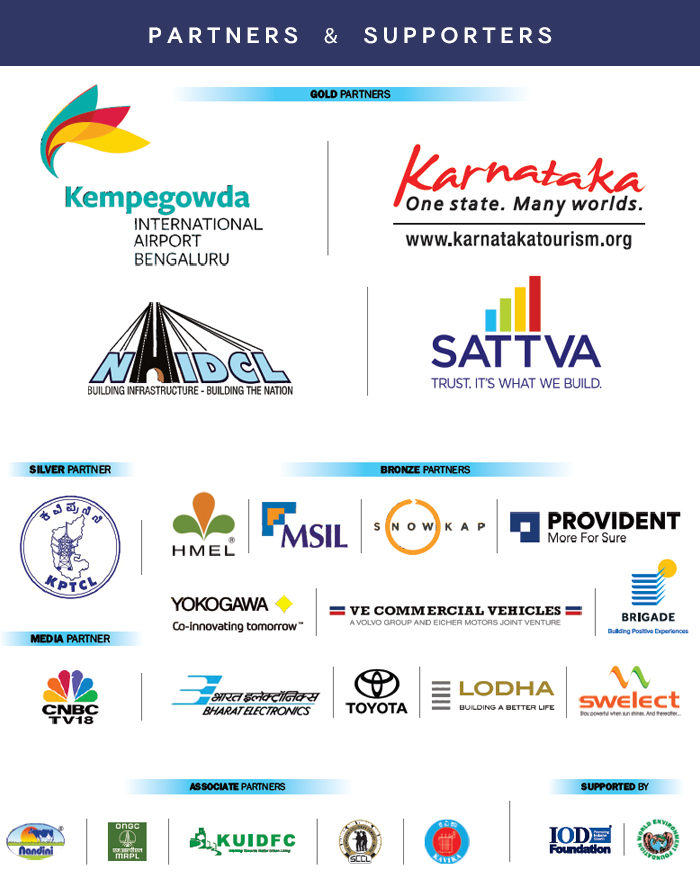
Author

Institute of Directors India
Bringing a Silent Revolution through the Boardroom
Institute of Directors (IOD) is an apex national association of Corporate Directors under the India's 'Societies Registration Act XXI of 1860'. Currently it is associated with over 31,000 senior executives from Govt, PSU and Private organizations of India and abroad.
Owned by: Institute of Directors, India
Disclaimer: The opinions expressed in the articles/ stories are the personal opinions of the author. IOD/ Editor is not responsible for the accuracy, completeness, suitability, or validity of any information in those articles. The information, facts or opinions expressed in the articles/ speeches do not reflect the views of IOD/ Editor and IOD/ Editor does not assume any responsibility or liability for the same.

 Quick Links
Quick Links
 Connect us
Connect us




 Back to Home
Back to Home


